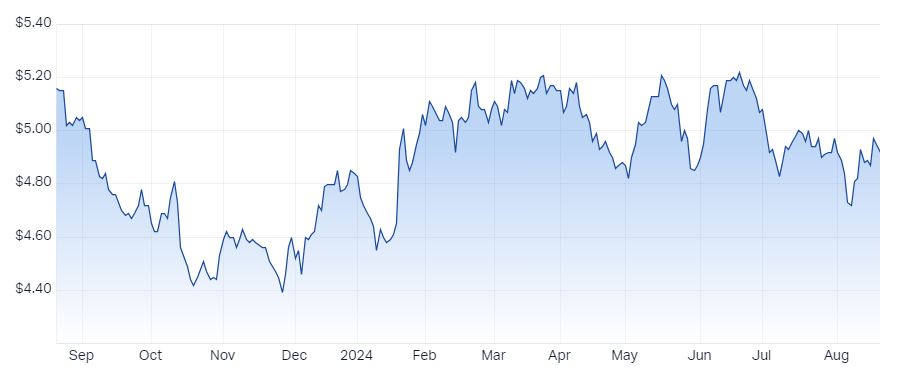Striking it big during a cost of living crisis is a sure bet for The Lottery Corp
There’s an old saying that there’s only two things you can count on in life: Death and taxes. You could probably add a third: People will always play the lottery.
This is where The Lottery Corporation (ASX: TLC) comes in. It’s just delivered a set of FY24 results that appear to confirm its stalwart status within Australia's consumer discretionary sector. CEO Sue van der Merwe said the company’s 16% increase in underlying profit was proof of the company’s “resilience and long-term attractiveness” as Aussies continued to look for a “low-cost” way to strike it rich during a cost of living crisis.
Indeed, several massive jackpots throughout the year, including an eye-watering $200 million Powerball jackpot and a $90 million Oz Lotto jackpot, stirred us into a lotto frenzy as we hoped to win ‘the big one’. It just meant fatter profits for TLC, and that means fatter returns for shareholders who will enjoy an increased fully franked final dividend of 8 cents per share (up from 6 cents per share last year) as well as a fully franked 2.5 cents per share special dividend.
It wasn’t a completely clean sheet for TLC though, as they were not totally immune from the prevailing weak consumer spending environment. Turnover for most base games was down 2% to 4% on a like-for-like basis as Aussies tightened their belts during the year and instead shifted their spend towards the more sporadic major jackpots.
In this wire, Hugh Giddy – Senior Portfolio Manager at IML – runs the ruler over TLC’s results and outlines why the company will likely continue to deliver reliable returns to shareholders.
FY24 Key Numbers
Revenue: +13.8% to $4 billion
EBITDA: +16.0% to $827 million
Net profit after tax: +56.3% to $414 million
Dividend: 8cps for FY24 total of 16 cents/share (up from 15cps in FY23) plus 2.5cps special dividend (all fully franked)

Hugh Giddy Senior Portfolio Manager and Head of Investment Research, IML
1. In one sentence, what was the key takeaway from this result?
It was a “resilient” result in the face of a tough consumer discretionary spending environment over the last 12 months.
2. Were there any surprises in the result that you think investors should be aware of?
There were both positive and negative surprises in the result. Positives include a 12% increase in new active users. There was also a strong gain in young users (between 18-44), and this will likely provide structural benefits for the company in the longer term. Digital sales as a percentage of overall sales improves, this is important because these have higher margins.
On the negative side, some extra operating expenditures perhaps the market wasn’t expecting, partly due to inflation that all companies are dealing with, for example wage inflation. There are also some higher costs associated with the Tabcorp separation. It’s possible that some of these costs weren’t fully factored into analysts’ estimates.
3. Would you buy, hold or sell The Lottery Corp. on the back of this result?
%2012-month%20price%20performance.%20Source%20Market%20Index,%20as%20of%20Wednesday%2021%20August%202024.png)
The Lottery Corporation (ASX: TLC) 12-month price performance. Source: Market Index, as of Wednesday 21 August 2024
Rating: BUY
Given the company has grown its earnings substantially over the last 12 months, whereas most companies have struggled to deliver such earnings growth. Also consider that TLS’s share price is roughly where it was 12 months ago, perhaps even a little lower, so this would indicate a degree of mispricing/underpricing. It’s a stock I still own in my own personal portfolio.
4. Are there any risks to The Lottery Corporation or the Consumer Discretionary sector that investors should be aware of?
There are substantial risks to the consumer discretionary sector in general as consumers continue to tighten their belts in the face of stubbornly high inflation and in the absence of interest rate cuts. On the first point, consumers have been able to dip into substantial savings built up during the pandemic as they couldn’t spend on things like holidays etc. and with the assistance of government support, but much of that has unwound and savings are therefore shrinking. Also, I wouldn’t expect we’ll be seeing any relief on interest rates soon as the RBA has made it clear it’s committed to fighting inflation, and they’re starting from a much lower point than their international peers who generally increased their official rates to higher levels than the RBA.
On the other hand, TLC operates in a very defensive segment of consumer discretionary. History suggests that even in times of lower economic activity, spending on lotteries tends to be quite resilient. Take for example, lottery spending in Australia has steadily grown at a rate of 4% per annum over the last 20 years. Long time users are reluctant to stop playing next week for fear that it would have been the week they would have won, and new players are drawn to the big jackpots particularly when times are tougher in the economy. Let’s just say that TLC is more likely to hold up better in a slow consumer spending environment than say, a company that sells furniture for example.
5. From 1 to 5, where 1 is cheap and 5 is expensive, how much value are you seeing on the ASX today? Are you excited or cautious about the market in general?
Rating: 4
I believe the broader market is at a 4. We’re not seeing a great deal of value out there at the moment, particularly in the banking sector which makes up a large portion of the Australian share market by market capitalisation. The banks are up about 40% since October last year which is hard to explain when they haven’t had any profit improvement.
Other sectors that we consider are frothy include those focussed on artificial intelligence and data storage, those stock prices are behaving like a bubble and those usually come to a sticky end in due course.
There are pockets of value, however. We still like Telstra Group (ASX: TLS) for its cash flow and earnings reliability. I don't think Telstra's expensive because they've got such a strong market position and they're coming from a position where the industry has just had a price war. Telstra has only just started the cycle of raising prices for mobile services, and this is a service that users consider to be really essential.
Another company we see great value in is Aurizon Holdings (ASX: AZJ), they've increased their earnings, yet the company’s share price is almost as low as it's ever been.

5 topics
1 stock mentioned
1 fund mentioned
1 contributor mentioned

